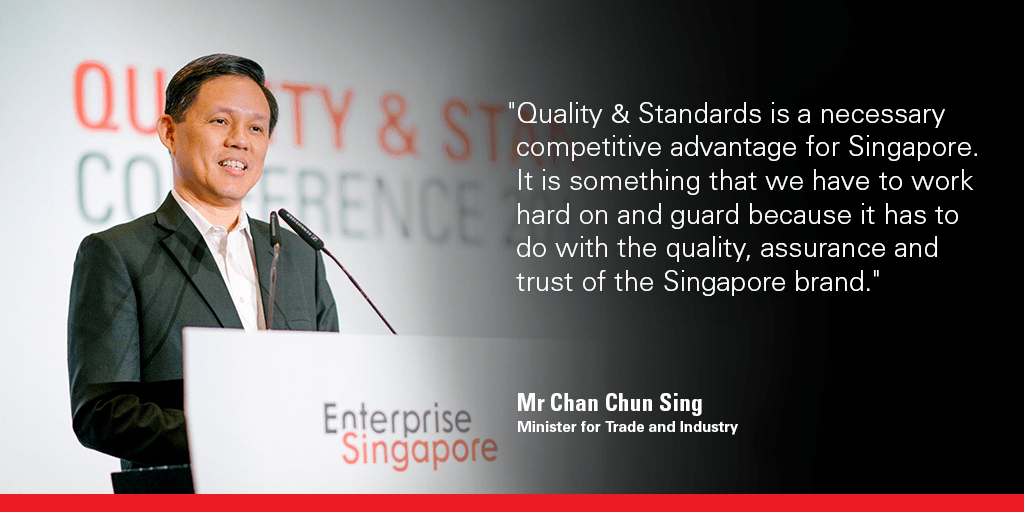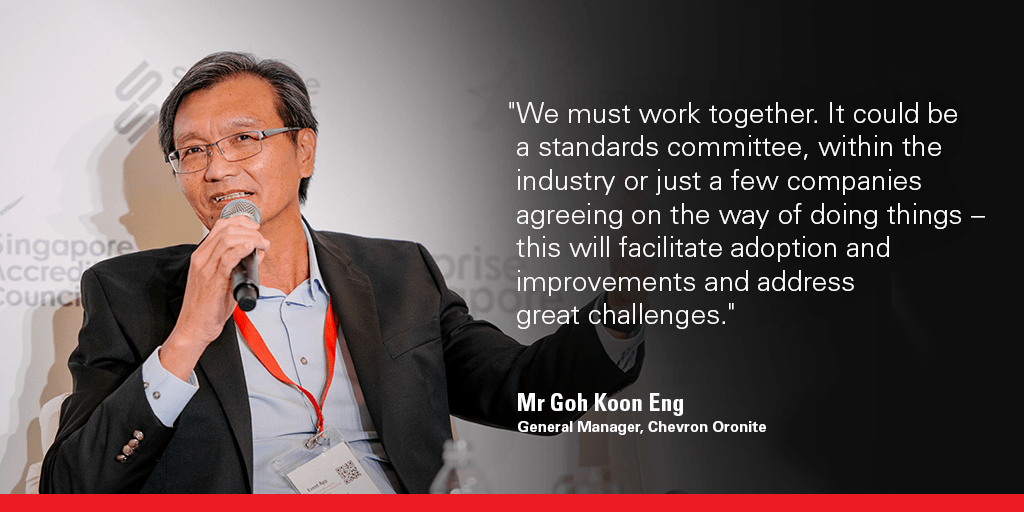Singapore has a strong reputation of producing quality goods and services, where many local brands adopt standards to earn trust around the world. So how should Singapore enterprises continue to leverage Quality & Standards (Q&S) in the fast-moving, hyperconnected digital economy?
The Quality & Standards Conference 2018, held on 26 July, explored this question and more with the theme, Enabling a Digital Economy. We bring you the conference highlights here.
3 Ways Singapore Enterprises Can Benefit from Q&S
Minister for Trade and Industry, Mr Chan Chun Sing, who was the Guest of Honour, highlighted three ways that Singapore enterprises can benefit from Q&S in the digital economy.

-
Singapore enterprises can grow their market share by focusing on quality in their goods and services
Many of us often choose to buy a product not because it has the lowest price, but because it is associated with quality. Trust in the quality of a product or service will become more important than ever in the digital economy. -
Singapore enterprises can seize opportunities beyond our boundaries by offering quality goods and services digitally
The online platform is a level playing field for enterprises around the world. There are opportunities to offer professional services – such as accounting, assurance, consulting and legal services – digitally, thereby overcoming the limitations of geographical boundaries.
Internationally, Singapore services remain competitive because of the quality, the standards adopted and the brand of trust that is synonymous with Singapore. This should not change. Even on digital platforms, Singapore enterprises must continue to deliver quality to stay competitive. -
Singapore enterprises can gain first-mover advantage by developing Q&S quickly with their goods and services
History has proven that it is not always the best product that wins. Instead, it is the one that develops the fastest, with the widest adoption rate, that finds an edge. Once a product is adopted widely and its standards established and proliferated in the market, others will jump on the bandwagon to adopt those standards.
The first-mover advantage of setting standards is critical – to do this, Singapore enterprises must move fast in developing their products and services and take them into the world.
The Role of Q&S in the Digital Economy
Speakers from large corporations in the manufacturing and digital services sectors were also invited to share their views on the future of Q&S. Here are three takeaways.
-
New role for standards in the digital economy
A spirit of creativity is needed in approaching standards, said Ms Judy Zhu, Senior Expert and Standardisation Director, Alibaba. “Today’s fast-changing world demands that we develop standards quickly – not standards that exist for paperwork, but real standards that can be implemented, solve problems and help us connect with and understand each other,” she said.
Mr Klein Raimund, Executive Vice President, Siemens, gave further insights on the new role of standards by describing how quality assurance will move into digital assurance and that will take the lead in defining data interoperability – a key element in future Q&S initiatives.
Mr Raimund said, “With digital assurance, there will be an increase in productivity, speed of production and mass customisation. The real innovation will be in data interoperability for seamless, real-time, end-to-end connectivity and remote device management – all of which leads to real-time decisions.” -
Collaboration to set standards remains crucial
While the definitions of standards will change, one crucial aspect remains: the need for collaboration to set standards, said Mr Goh Koon Eng, General Manager, Chevron Oronite.
Mr Goh added that by collaborating to develop standards, industries can eliminate inefficiencies, share data across verticals and communicate intelligently. This will also enable innovation.
He invited companies to share their efforts in Q&S. “If you’re developing standards, make it known to the industry, so that it invites collaboration and prevents duplication,” he said. -
Startups can punch above their weight with Q&S
Mr Eddie Chau, Co-founder and Chairman, Innosenze, urged local startups to prioritise standards because it will enhance rather than threaten their survival.
Chau said many startups and SMEs have the perception that developing standards means heavy costs and long-drawn processes. “I urge them to think differently. Standards are a really strong marketing tool rather than a cost.” He further emphasised that startups and SMEs need to conform to the highest standards in order to punch above their weight globally. “Standards enable us to be regionally and globally competitive,” he said.
Want to be involved in standards development? Indicate your interest at standards@enterprisesg.gov.sg
The Quality & Standards Conference 2018 was jointly organised by Enterprise Singapore, the Singapore Standards Council and the Singapore Accreditation Council.

